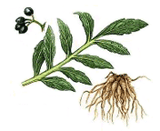
Black Cohosh
Introduction
This fact sheet provides basic information about the herb plant or part of a plant used for its flavor, scent, or potential therapeutic properties. Includes flowers, leaves, bark, fruit, seeds, stems, and roots. black cohosh-common names, uses, potential side effects, and resources for more information. Black cohosh, a member of the buttercup family, is a plant native to North America. It was used in Native American medicine and was a home remedy in 19th-century America.Common Names
black cohosh, black snakeroot, macrotys, bugbane, bugwort, rattleroot, rattleweedLatin Names
Actaea racemosa, Cimicifuga racemosaWhat It Is Used For
- Black cohosh has a history of use for rheumatism (arthritis and muscle pain) but has been used more recently to treat hot flashes, night sweats, vaginal dryness, and other symptoms that can occur during menopause.
- Black cohosh has also been used for menstrual irregularities and premenstrual syndrome, and to induce labor.
How It Is Used
The underground stems and roots of black cohosh are commonly used fresh or dried to make strong teas (infusions), capsules, solid extracts used in pills, or liquid extracts (tinctures).What the Science Says
- Study results are mixed on whether black cohosh effectively relieves menopausal symptoms. An NCCAM-funded study found that black cohosh, whether used alone or with other botanicals, failed to relieve hot flashes and night sweats in postmenopausal women or those approaching menopause.
- Most studies to date have been less than 6 months long, so the safety of long-term use is unknown.
- NCCAM is funding studies to further understand the potential effects of black cohosh on hot flashes and other menopausal symptoms.
- There are not enough reliable data to determine whether black cohosh is effective for rheumatism or other uses.
Side Effects and Cautions
- United States Pharmacopeia experts suggest women should discontinue use of black cohosh and consult a health care practitioner if they have a liver disorder or develop symptoms of liver trouble, such as abdominal pain, dark urine, or jaundice. There have been several case reports of hepatitis (inflammation of the liver), as well as liver failure, in women who were taking black cohosh. It is not known if black cohosh was responsible for these problems. Although these cases are very rare and the evidence is not definitive, scientists are concerned about the possible effects of black cohosh on the liver.
- Black cohosh can cause headaches and stomach discomfort. In clinical trials comparing the effects of the herb and those of estrogens, a low number of side effects were reported, such as headaches, gastric complaints, heaviness in the legs, and weight problems.
- No interactions have been reported between black cohosh and prescription medicines.
- It is not clear if black cohosh is safe for women who have had breast cancer or for pregnant women.
- Black cohosh should not be confused with blue cohosh (Caulophyllum thalictroides), which has different properties, treatment uses, and side effects than black cohosh. Black cohosh is sometimes used with blue cohosh to stimulate labor, but this therapy has caused adverse effects in newborns, which appear to be due to blue cohosh.
- Tell your health care providers about any complementary and alternative practices you use. Give them a full picture of what you do to manage your health. This will help ensure coordinated and safe care.
Sources
- Mahady GB, Low Dog T, Barrett ML, et al. United States Pharmacopeia review of the black cohosh case reports of hepatotoxicity. Menopause. 2008;15(4 Pt 1):628-638.
- Newton KM, Reed SD, LaCroix AZ, et al. Treatment of vasomotor symptoms of menopause with black cohosh, multibotanicals, soy, hormone therapy, or placebo: a randomized trial. Annals of Internal Medicine. 2006;145(12):869-879.
- Office of Dietary Supplements and National Center for Complementary and Alternative Medicine. Questions and Answers About Black Cohosh and the Symptoms of Menopause. Office of Dietary Supplements Web site. Accessed on July 2, 2007.
- National Center for Complementary and Alternative Medicine and Office of Dietary Supplements. Workshop on the Safety of Black Cohosh in Clinical Studies. National Center for Complementary and Alternative Medicine Web site. Accessed on July 2, 2007.
- Natural Medicines Comprehensive Database. Black cohosh. Natural Medicines Comprehensive Database Web site. Accessed on June 29, 2007.
- Natural Standard Database. Black cohosh (Cimicifuga racemosa [L.] Nutt.). Natural Standard Database Web site. Accessed June 28, 2007.
- Black cohosh root. In: Blumenthal M, Goldberg A, Brinckman J, eds. Herbal Medicine: Expanded Commission E Monographs. Newton, MA: Lippincott Williams & Wilkins; 2000:22-26.
- NCCAM National Institutes of Health






